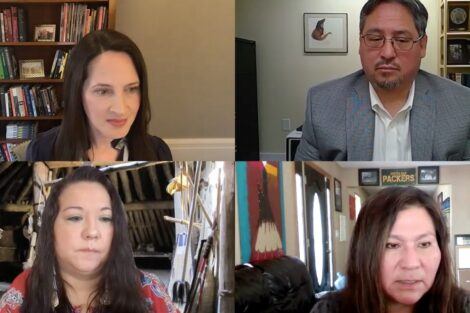April 20, 2022 – Fossil fuel production causes significant environmental health effects in Indigenous communities, and leadership from frontline Indigenous activists has been critical in fighting these environmental injustices, according to experts who spoke at a Harvard T. H. Chan School of Public Health event.
The April 14, 2022 discussion, held in advance of Earth Day, highlighted health impacts of extracting fossil fuels. “Few communities know better the harms of fossil fuel reliance than Indigenous communities,” said Aaron Bernstein, interim director of the Center for Climate, Health and the Global Environment (Harvard Chan C-CHANGE), in his opening remarks.
The event was hosted by Harvard Chan C-CHANGE, the François-Xavier Bagnoud (FXB) Center for Health and Human Rights at Harvard University, the Harvard University Native American Program (HUNAP), and the Native American Alumni of Harvard University.
“In the recent weeks, we’ve seen calls for increased production of American oil and gas in the context of the war in Ukraine, which makes our conversation today seem especially crucial,” said moderator Katherine Todrys, author of the book Black Snake.
Two of the panelists are from the Fort Berthold Indian Reservation in North Dakota, a major site of oil and gas production: Kandi White, native energy and climate campaign coordinator at the Indigenous Environmental Network; and Lisa DeVille, co-founder of Fort Berthold Protectors of Water and Earth Rights. Both of them shared firsthand experiences of growing up and living near oil and gas operations.
When White was diagnosed with a stage four sarcoma tumor at 20 years old, her first thought was, “now it’s my turn.” She knew many people in her community with cancer.
“Natural resources in the form of oil, coal and gas, uranium, were discovered on our tribal lands, and we were in the way, and so we became the first and worst impacted,” White said. In 2014, a wastewater spill from an oil pipeline turned Fort Berthold’s drinking water a bright, unnatural blue. Additionally, fracking produces gas flares that “everybody living there—my family, my friends—are breathing in every single day, 24/7 nonstop,” she said.
DeVille told how she and her husband got sick with a persistent cough, attributing it to environmental pollution. “Our land, our water is sacred to us,” she said. “We were always taught how to take care of the earth. We were never taught how to destroy the earth.”
Her advocacy work focuses on conducting studies to assess exactly how fossil fuel production affects people’s health and the environment, and using the data to push for regulations to limit the negative impacts.
Such activism by Indigenous people has been successful in the past, according to panelist Joseph Gone, professor of anthropology and of global health and social medicine in Harvard’s Faculty of Arts and Sciences, faculty director of HUNAP, and a professor in the Department of Social and Behavioral Sciences at Harvard Chan School. His late father, Joseph Azure, led a successful movement in the 1990s to stop gold mining in the Little Rocky Mountains in Montana, which are next to the Fort Belknap Indian Reservation.
Azure mobilized a multi-racial, multi-ethnic coalition of individuals to oppose heap leaching, a mining process that uses cyanide to extract gold. By gathering their own water samples for independent analysis, they showed poisonous levels of chemicals in the waterways. As part of a federal court settlement, the mining company paid toward cleaning up the environment, although restoration challenges remain even now.
“You never know what the outcome can be. Often, it’s a very hopeless feeling,” Gone said. “But there are instances like this where if the right people gather together and are persistent enough, and things align just right … you can be victorious in stopping some of this sort of thing.”
In her closing remarks, Natalia Linos, executive director of the FXB Center, echoed Gone’s sentiments: “The stories of resistance and persistence shared today, including the ways that grassroots science and coalitions have formed to fight environmental injustice, are truly inspiring.” She added, “Globally, Indigenous communities are stewards of 80 percent of the world’s biodiversity, and therefore their leadership is critical and essential for the health of all of us.”
